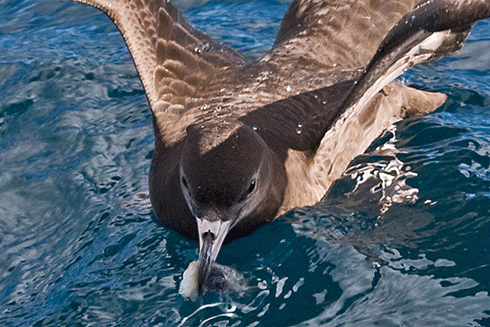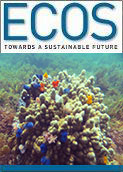
|
Published: 10 February 2014
Research links trace toxic metals in seabirds to plastic pollution
New research by the University of Tasmania (UTAS) has examined the toxic effects of seabirds ingesting marine plastic pollution and population decline.

|
|
A flesh-footed shearwater feeding at sea: fledglings are particularly prone to accidental ingestion of plastic. Credit:
Tony Morris
|
UTAS' Institute for Marine and Antarctic Studies (IMAS) Research Fellow Dr Jennifer Lavers conducted the study over four years in collaboration with researchers at the Lord Howe Island Museum and Royal Society for the Protection of Birds.
The study sampled the breast feathers and stomach contents from Flesh-footed Shearwater fledglings in eastern Australia.
Her paper ‘Plastic ingestion by Flesh-footed Shearwaters (Puffinus cameipes): Implications for fledgling body condition and the accumulation of plastic-derived chemicals’, has just been published online in the international journal, Environmental Pollution.
The research found the number of birds ingesting plastic increased over the four-year study, with more than 60 per cent of fledglings exceeding international targets for plastic ingestion by seabirds.
What is more, 16 per cent of fledglings failed those targets after a single feeding.
Birds with high levels of ingested plastic exhibited reduced body condition and increased contaminant load.
Dr Lavers said this is the first paper anywhere in the world to link high levels of trace metals to the ingestion of marine plastic pollution.
‘What we have been missing from the equation is the ability to look beyond the visual – beyond the plastic bits – and into the animal's tissues to see what damage the plastic has caused by introducing toxins (such as trace metals like mercury and arsenic) into the birds,’ she said.
Dr Lavers said while the research reported an increase from 79 per cent to 90 per cent in frequency of plastic consumption, it also recorded the highest total amount (mass) of plastic ingested by any marine species worldwide.
‘We are providing quantitative data on the demographic impact of ingested plastic (i.e. reduced seabird body condition and likely reduced juvenile survival) which is crucial information for wildlife managers to be able to account for mortality and morbidity in their management plans,’ she said.
‘It seems obvious that ingesting plastic would be bad for wildlife, but until now, no one has been able to show what role plastic plays in driving population trends.
‘Our results indicate marine plastic pollution is a serious threat to the Flesh-footed Shearwater, a worrying result in light of increasing demand for plastic products and the more than 20 million new pieces of plastic that enter the world's oceans every day.’
Source: UTAS



